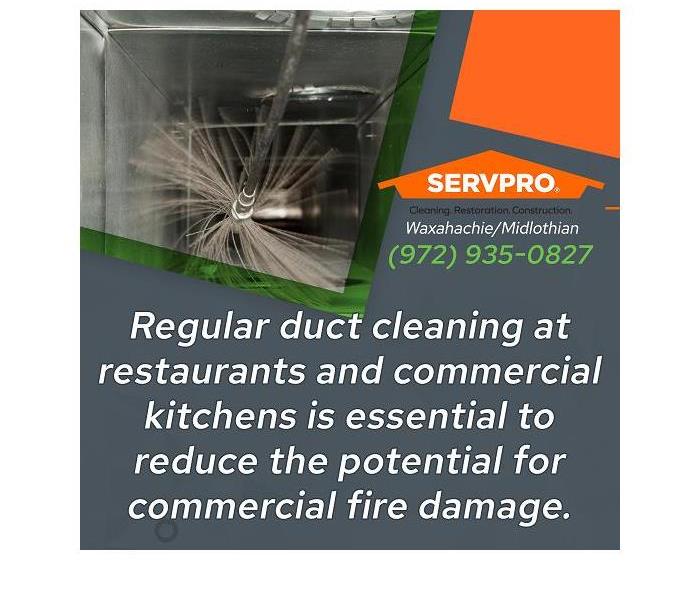How Frequently Should Midlothian, TX, Restaurants Have Their Ducts Cleaned to Avoid Fire Damage?
7/16/2022 (Permalink)
Blog Summary: SERVPRO of Waxahachie/Midlothian offers insight on scheduling inspections and cleaning of exhaust systems in restaurants and other commercial cooking operations such as senior centers, churches, day camps, and schools.
SERVPRO of Waxahachie/Midlothian explains how frequently restaurants should have their exhaust system and ducts cleaned to prevent fire damage. Regular duct cleaning at restaurants and commercial kitchens is essential to reduce the potential for commercial fire damage.
In the restaurant and food services industry, clean ducts are crucial for preventing fire damage. Every commercial kitchen should maintain clean ducts whether usage is high or low. Dirty, greasy ducts are a fire hazard. As time passes, even commercial kitchens that are used infrequently need attention.
Duct cleaning frequency is a vital component of a fire prevention strategy in a restaurant or commercial kitchen. Important questions that Midlothian, TX, restaurant owners or commercial kitchen managers should address are:
- How often should ducts be inspected?
- How often should the ducts be cleaned?
- Who should inspect and clean the ducts?
Inspection Frequency
Activities in commercial kitchens create fire hazards. Open flames and hot burners are numerous. Flammable liquids used in the cooking process raise the risk hazard of fire, and combustible materials such as the food being cooked, paper and cloth napkins, rags, and clothing are everywhere. If the fire and heat in the kitchen ever become uncontrolled, serious structural damage and personal injury to the staff and customers can result.
Inspections are the key to a safe kitchen. Frequent inspections monitor a situation that only worsens over time. Key indicators will signal the need to schedule a cleaning. Vigilance is the key ingredient to a safe kitchen. How frequently should the exhaust system be inspected? The answer is largely determined by the volume of cooking that takes place in the commercial cooking operation. The higher the cooking volume, the more frequently the system should be inspected. Higher usage yields greater grease and grime buildup. When inspections reveal that the conditions in the exhaust system need attention, a cleaning can be scheduled. Not every inspection will call for a cleaning. Cooking frequency may be reduced. The menu may have changed or shifted emphasis, resulting in decreased preparation of grease-producing foods. Inspections are still instrumental in determining when an exhaust system should be cleaned.
Cleaning Frequency
Restaurants and other commercial cooking operations that are active around the clock will require more frequent inspections and cleaning. Both inspections and cleaning should be conducted on a quarterly basis in cooking operations that are around the clock. As soon as an inspector determines that cleaning is needed, prompt action should be taken to make the exhaust system safe from fire hazards and compliant with any applicable regulatory code.
Commercial and institutional cooking operations that sustain a moderate cooking volume, such as only one meal a day, would require less frequent inspections and cleaning. Inspections and cleaning need only take place two or three times a year. The nature of the food being prepared may have a bearing on the cleaning schedule. A breakfast-only restaurant or a lunch-only short order diner with a heavy menu of fried and grilled items would need extra inspections and cleaning to remove the heavy grease buildup.
Light duty cooking operations that are only open seasonally should have the exhaust system cleaned annually. A commercial kitchen at a church may fall into this category. Food prep may consist of a weekly fellowship meal or an occasional breakfast, fish fry, or wild game dinner. Grease and grime buildup may not have reached the critical point of creating a fire hazard, but cleanliness and odor do become a factor when grease becomes rancid and begins to smell.
An inspection and cleaning schedule that reflects cooking volume, type of cooking equipment, and the typical menu can be determined by thoroughly cleaning a duct and then returning in thirty days to measure the accumulated grease. When in doubt, clean it out! Cleaner is always safer, especially when lowering the risk of fire damage is a factor in the inspection and cleaning equation.
Why Call SERVPRO When a Fire Damage Disaster Strikes
Locally owned and operated, SERVPRO of Waxahachie/Midlothian has been serving the area since 2000. Available 24/7, 365 days a year, the team of fire damage cleanup and damage restoration professionals provide a rapid response and a quick cleanup to get fire-damaged businesses up and running as soon as possible.
To learn more about Midlothian, TX, commercial fire damage restoration, contact the SERVPRO of Waxahachie/Midlothian office by email at acarey@SERVPRO10932.com or by phone at (972) 935-0827.



 24/7 Emergency Service
24/7 Emergency Service
